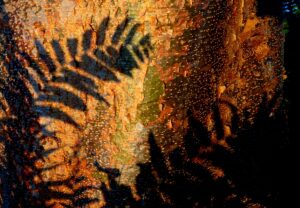Poem by ZHANG QIAOHUI
Translated from the Chinese by YILIN WANG
Poem appears below in both English and Chinese.
Soliloquy
You know where Grandma is buried, but do not know
where Grandma’s Grandma is
Poem by ZHANG QIAOHUI
Translated from the Chinese by YILIN WANG
Poem appears below in both English and Chinese.
Soliloquy
You know where Grandma is buried, but do not know
where Grandma’s Grandma is
Transcript: Cheryl Collins Issac Podcast.
Cheryl Collins Isaac speaks to managing editor Emily Everett about her story “Spin,” which appears in The Common’s new spring issue. “Spin” is about two Liberian immigrants making a new life in Appalachia. In this conversation, Cheryl talks about the inspiration behind this story: writing from music and toward beautiful, sensual language. She also discusses Liberia’s interesting cultural history, her writing and revision process, and what it’s like to do a writing residency in Edith Wharton’s bedroom.

New poems from our contributors AKWE AMOSU, JUDITH BAUMEL, and ELIZABETH METZGER
Table of Contents:
Akwe Amosu | New citizen
Judith Baumel | Irij
Elizabeth Metzger | Talking to Jean about Love
| Talking to Jean about Love II
Poems by ALEJANDRA PIZARNIK
Translated from the Spanish by ILAN STAVANS

Mexico City, Mexico
Translator’s Note
Translation is home. Whenever I travel, I seek it either by reading translations, or by translating as a grounding exercise. Lately I have been translating into English poems from Jewish Latin American poets, specifically works by conversos or those written in Yiddish and Ladino by immigrants and their offspring. And—in a room of her own—Alejandra Pizarnik, whose life makes me think of Emily Dickinson. I recreated these two poems while visiting my mother, who has been suffering from Alzheimer’s. Pizarnik distills the fibers of existence so as to reveal the madness that palpitates underneath. Her poetry is contagious. The toughest part is to convey her silences. I wish I had met her.
—Ilan Stavans
Curated by ELLY HONG
Issue 23 of The Common features work by a wide array of writers from across the globe. Take a look at some of the writing that has inspired them in this month’s round of Friday Reads.
By CAREY BARAKA
DeMISTY D. BELLINGER interviewed by AMY REARDON

One of the best things about interviewing the poet, professor, and novelist DeMisty D. Bellinger, Ph.D., is how she drops a book recommendation into every answer. Another is the transparent manner in which she speaks of her work: her writing is so intentional that the scenes and characters seem to crawl inside the reader and live there. Once seen, the characters in Bellinger’s debut novel cannot be unseen. Released on April 19, 2022, by Unnamed Press, New to Liberty tells the stories of Sissily, Nella, and Greta, three lives sewn together by Dust Bowl-era Kansas, tragedy, and their own longings. Amy Reardon and DeMisty Bellinger spoke via phone and discussed whose experience gets centered in literature, how to give voice to the unvoiced, and Bellinger’s desire to write from questions to figure out how the world works.
Transcript: Nathan Jordan Poole Podcast.
Nathan Jordan Poole speaks to managing editor Emily Everett about his story “Idlewild,” which appears in The Common’s new spring issue. In this conversation, Nathan talks about doing seasonal work at Christmas tree farms, the workers from all walks of life he met there, and how those experiences and those people helped to inspire this story. He also discusses his writing and revision process, his story collections and future projects, and why he chooses to write unromantically about rural life.

By ADA NEGRI
Translated from Italian by LAURA MASINI, CHONA MENDOZA, and LINDA WORRELL
Story appears in both English and Italian below.
Translators’ Note:
“In the Fog” is taken from Le Solitarie (1917), Ada Negri’s first collection of stories, astute portraits of marginalized women struggling with poverty, exploitation and loneliness. Raimonda is a young woman who was horribly disfigured by a fire in her childhood. Only in the dense and murky fog of Milan, her face concealed by a “nebulous mass of vapors,” does she feel free.
We decided to work together at the close of a week-long Italian translation workshop at the British Centre for Literary Translation and we chose this story because we were captivated by Negri’s richly evocative prose. Much of our lively collaboration, helped along by Tuscan reds, seppie in zimino, minestra di fagioli and lesso rifatto, took place in Lucca and Florence.
—Linda Worrell, Chona Mendoza, Laura Masini
By JAMES STAIG
This piece is an audio recording. A transcript appears below.